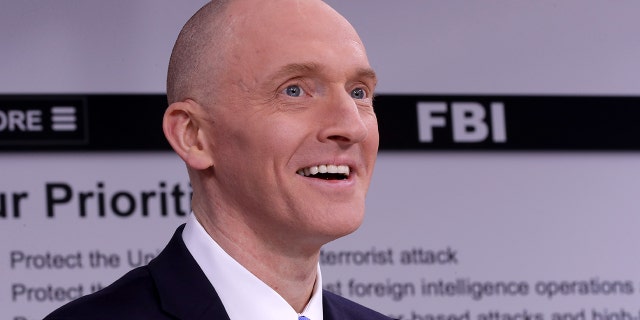By Hollie McKay | Fox News
A Republican push to reform the Foreign Intelligence Surveillance Act has gained fresh momentum on Capitol Hill amid the fallout of the long-awaited findings of Michael Horowitz, the Department of Justice’s inspector general who illuminated an array of abuses and misdeeds pertaining to government surveillance tools during the Russia investigation.
COMEY ADMITS ‘I WAS WRONG’ ON FISA CONDUCT, REMAINS DEFIANT ON DOSSIER IN TENSE INTERVIEW
Reps. Chris Stewart, R-Utah, and Brad Wenstrup, R-Ohio, last week introduced the FISA Improvements Act in a bid to “stop these abuses” and effectively amend FISA by adding requirements on the FBI, the DOJ and on the Foreign Intelligence Surveillance Court (FISC), which would also give Congress “critical new insight to perform oversight of the FISA powers.”
“The deceptive actions of a few high-ranking officials within the FBI and the Department of Justice have eroded public trust in our federal institutions,” Stewart stated. “They flattened internal guardrails, deceived the FISA court, and irreparably damaged the reputation of an innocent American.”
That American was 2016 Trump campaign aide, Carter Page. Horowitz’s report noted “17 significant errors or omissions” in the application process for FISA warrants for Page, and underscored “many additional errors,” including how the FBI informed the FISA court that its primary source outlining possible collusion with Russia, Christopher Steele, was credible without verifying his assertions. Horowitz also found that investigators withheld crucial details from the FISA tribunal that may have cast doubt on the credibility of Steele’s dossier of claims about Trump.
“FISA is an important tool in the U.S. fight against espionage and terrorism, and the vast majority of FISA warrants no doubt comply with the original purpose of the Act,” Francey Hakes, a former DOJ official, told Fox News. “But the IG report shows quite clearly the process can be manipulated. FISA reforms are necessary to ensure this never happens again.”
The GOP bill would mandate that amicus curiae – an impartial court advisor – be assigned to all cases where a U.S. person is involved. It would also ensure that the DOJ disclose “any usage of unverified information in the application,” and include a provision in which any FISA extensions are heard or denied by the same judge which “ensures that the government is not able to obfuscate details of an expiring order’s newly gathered evidence to support renewal.”
Additionally, Rep. Warren Davidson, R-Ohio, has also upped his call for “sweeping reforms” in the wake of Horowitz’s findings.
“The secrecy of the court and the actions taken by FBI investigators show that it is too easy to abuse our government’s surveillance program. Investigators didn’t vet the Steel dossier properly and neglected to inform the FISA court that it was funded by the DNC,” Davidson stated. “We need to reassert the fourth amendment and protect the privacy of all Americans – including candidates for political office.”
The hallmark Fourth Amendment prohibits arbitrary searches or seizures.
And Sen. Mike Lee, R-Utah, has also joined the growing chorus of Republicans urging swift action and new legislation with “major reforms.” Even some well-known GOP hawks have decried the revelations in Horowitz’s report, as Senate Judiciary Committee Chairman Lindsey Graham, R-S.C., vowed that the errors “should scare the hell out of us.”
Yet in June this year, the House voted against a bipartisan amendment to FISA, proposed by then-GOP Rep. Justin Amash and Democratic Rep. Zoe Lofgren, which would have halted the 2020 funding for FISA’s Section 702, which was only authorized in 2008 as a means to monitor communications by foreign nationals outside the U.S. Amash later left the Republican Party to become an independent.
Scores of civil liberties groups, ranging from the American Civil Liberties Union (ACLU) to the Electronic Privacy Information Center (EPIC) to the Government Accountability Project have also re-invigorated their campaigns for FISA transparency amendments, urging lawmakers to take action and stressing that if such egregious errors could happen to a Presidential candidate, it likely has happened to scores of others.
“FISA benefits law enforcement by approving court surveillance necessary to conduct national security investigations. But like any process that sanctions secrecy, in order to be effective, it requires integrity, honesty, and diligence on behalf of law enforcement,” explained Wendy Patrick, a career trial attorney and business ethics lecturer. “As with an attempt to procure a warrant in any court, if agents omit important evidence, fail to correct past inaccuracies, or misrepresent facts, the judge´s decision will be compromised. Judicial decisions are only as accurate as of the facts on which they are based.”

A former Trump campaign advisor, Carter Page was the subject of electronic surveillance by the FBI because a judge found probable cause that he was acting as an agent of the Russian government. (Photo by Chip Somodevilla/Getty Images)
FISA was brought to life in the 1970s after the Church Committee unearthed a number of disconcerting abuses, thus prompting Congress to pass the legislation in 1978. While its original intent was to safeguard U.S. citizens against government snooping, some experts argue it has moved far from that intent in recent decades.
The act brought with it the FISC functions as a secret tribunal, made up of several federal judges selected by the chief justice of the U.S. Supreme Court to serve seven-year terms. The tribunal has the power to approve warrants for electronic surveillance, allowing wiretapping, phone, email, computer, microphone, and physical searches of an alleged “foreign power or an agent of a foreign power,” which may include Americans or citizens suspected of being engaged in terrorism or espionage.
According to Elizabeth Goitein, co-director of the Liberty & National Security Program at the Brennan Center for Justice, “over time parts of the law have been weakened to make it easier to collect certain kinds of information about Americans, which has had the effect of eroding privacy.”
“For instance, under FISA’s so-called ‘business records’ provision, the government was previously allowed to obtain only certain types of records, and it had to persuade the FISA Court that the subject of the documents was a foreign power or agent of a foreign power. Section 215 of the Patriot Act amended the law to permit the government to obtain literally ‘any tangible thing’ upon a mere showing of relevance to a foreign intelligence investigation,” Goitein said. “It is this provision that the National Security Agency (NSA) exploited after 9/11 to collect Americans’ phone records in bulk, although Congress effectively ended that practice when it passed the USA Freedom Act in 2015.”
Another example, she underscored, is the addition of Section 702 in 2008. This authority allows the NSA to engage in a “programmatic” collection of foreigners’ communications, including their communications with Americans, without an individualized court order.
“The FISA Court’s role is limited to signing off on the broad procedures for the program – a much more limited role than Congress ever contemplated when it originally enacted FISA. The FBI has exploited this large-scale, warrantless collection; it routinely combs through the data collected by the NSA looking for Americans’ phone calls and e-mails to use against them in purely domestic criminal investigations,” Goitein said.
And if a FISA request is denied, there is the option for appeal. Yet almost every application, more than 99 percent, of the tens of thousands put forward by investigators, has been rubber-stamped. As to why the rejection rate is so low, according to legal experts, the answer comes down to whom you ask.
“Law enforcement would argue because they do such a great job compiling evidence on the front end in order to provide the court everything it needs to make a decision. Most investigators work diligently to build a strong case before submitting a warrant application to the judge,” Patrick surmised. “Skeptics, on the other hand, would argue that the rejection rate is so low because courts rely too heavily on the representations of law enforcement, including the assumption that the evidence submitted includes any exculpatory facts the court should consider. The IG report indicates this is not always the case.”
And the latest IG revelations are not the first time FISA has been exposed for misgivings.
The DOJ admitted that in the year 2000, mistakes were made in 75 surveillance and search applications, which was then documented in an opinion by FISC. In 2002, the court also claimed that FBI agents had issued false or misleading assertions leading a top counterterrorism official to be permanently barred from appearing before FISC. Three years later, it was reportedly proposed by FISA chief judge Colleen Kollar-Kotelly that FBI agents swear on the accuracy of the information put forth, but it was squashed over concerns it would significantly slow the process.
The department’s inspector general also concluded that approximately 54 percent of the reports analyzed in 2004 and 47 percent in 2005 were categorized as having been subjected to “improper use of FISA authorities.” Intercepted communications “outside the scope of the FISC order, whether due to FBI or third-party error,” meaning that some were wrongly targeted as a result of infringements stemming from the wrong telephone number, wrong locations, and improperly disseminated FISA-derived information.
In 2008, a DOJ inspector general audit additionally found that in 2006 the FBI submitted 47 requests to the FISC to obtain business information, and when two were denied, investigators then used national security letters (NSL) to access the data anyway.
HUNTER BIDEN’S CHINA CONNECTIONS PLAGUED BY ETHICS QUESTIONS AND NATIONAL SECURITY CONCERNS
Documents leaked to the Washington Post at that time illuminated the depths of wrongful targeting. In one case in 2008, a “large number” of calls from Washington D.C. were captured in error as the “202” D.C. area code was entered as opposed to “20,” the country code for Egypt.

A U.S. flag hanging from a steel girder, damaged in the Sept. 11, 2001 attacks on the World Trade Center, blows in the breeze at a memorial in Jersey City, N.J., Sept. 11, 2019 as the sun rises behind One World Trade Center building and the re-developed area where the Twin Towers of World Trade Center once stood in New York City on the 18th anniversary of the attacks. (AP Photo/J. David Ake)
In 2017, another FISA court decision unleashed an array of violations, including “illegally sharing raw intelligence with unauthorized third parties to accessing intercepted attorney-client privileged communications without proper oversight.”
Documents were also declassified in October this year, highlighting that in 2017 and 2018, several warrantless searches had been undertaken of U.S. citizen’s emails despite congressional legislation to end mass collection and that improper queries of the NSA intelligence database had frequently occurred.
The current FISA reform drive comes just months ahead of the forthcoming debate concerning key provisions of the Patriot Act, which was hastily implemented after Sept. 11 to grant authorities widespread powers to monitor individuals suspected of terrorist ties, poised to expire in March.
“The Patriot Act has critical importance to our national security, but Congress must increase its vigilant oversight of the program,” Hawkes added. “Both the DOJ and FBI must promulgate new regulations covering surveillance of Americans and, especially, surveillance of any kind of political figures.”Hollie McKay has a been a Fox News Digital staff reporter since 2007. She has extensively reported from war zones including Iraq, Syria, Yemen, Afghanistan, Pakistan, Burma, and Latin America investigates global conflicts, war crimes and terrorism around the world.






